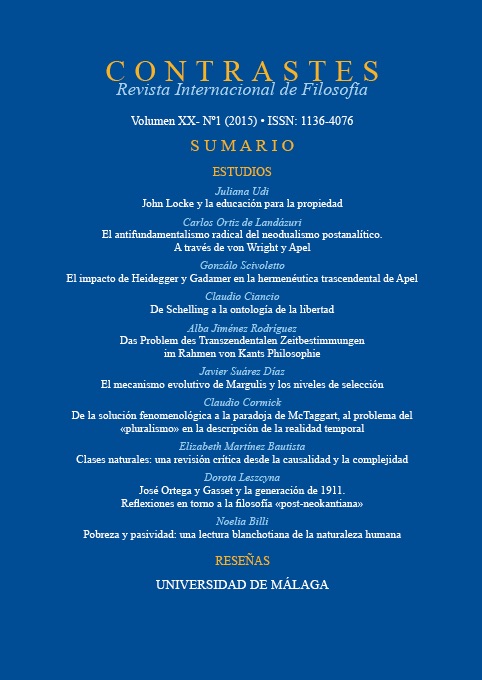Natural Kinds: a critical review from causality and complexity
DOI:
https://doi.org/10.24310/Contrastescontrastes.v20i1.2302Keywords:
Natural Kinds, Causality, Complexity, Scientific Practices, Epistemic Possibility SpacesAbstract
Natural kinds have an important epistemic value that has not been studied due to the fact that the philosophical research has been focused on both semantics and logical aspects. I propose a critical review from causality and complexity to the concept of «natural kind» advanced by Homeostatic Properties Cluster Theory (HPC) in order to demonstrate that the kinds in the HPC style s are not supported by scientific practices such as biology. I think that a different concept of “natural kind” should be based on scientific practices in order to obtain a better philosophical understanding compared to HPC of both, natural processes and obtaining successful inferences. I hold that this epistemic approach provides us a new characterization of “natural kind” that will be useful as a unifying concept of natural phenomena, as well as for generating new spaces of epistemic possibility.Downloads
Metrics
Publication Facts
Reviewer profiles N/A
Author statements
Indexed in
-
—
- Academic society
- N/A
- Publisher
- Universidad de Málaga
Downloads
Published
How to Cite
Issue
Section
License
This journal provides immediate free access to its content under the principle of making research freely available to the public. All content published in Contrastes. Revista Internacional de Filosofía, are subject to the Creative Commons Attribution-NonCommercial-ShareAlike 4.0 license whose full text can be found at <http://creativecommons.org/licenses/by-nc-sa/4.0>
It is the responsibility of the authors to obtain the necessary permissions of the images that are subject to copyright.
Authors whose contributions are accepted for publication in this journal will retain the non-exclusive right to use their contributions for academic, research and educational purposes, including self-archiving or repository in open access repositories of any kind.
The electronic edition of this magazine is edited by the Editorial Service of the University of Malaga (Uma Editorial), being necessary to cite the origin in any partial or total reproduction.










5.png)
